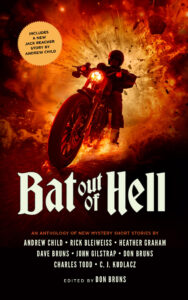Sad news to report: After 42 years, the Bulwer-Lytton Fiction Contest, which showed how hilariously horrible the English language can be, is no more after its founder decided to retire it. Founded in 1983, the contest was to compose the most atrocious opening sentence to the worst novel never written.
If you think Edward Buller-Lytton’s opus, “It was a dark and stormy night…” was a masterpiece of pukable purple prose, you should check out some of the beauts and treasures housed at the BLFC website. I spent time scrolling through the list of winners and runners-up for each year. In no orchestrated and orderly organization, here are some spectacular and stunningly-silly specimens spewed by competent, creative creatives.

“Gwendolyn, a world-class mountaineer, summoned the last of her strength for one more heroic haul on the nylon strap (for she was, after so many failed attempts, dangerously close to exhaustion) and looked heavenward with resolve, aware that, in spite of her fatigue and anguish, she must breach the crevice in one well-coordinated movement, somehow cleave the smooth fissure with the flimsy synthetic strand even though she was chaffed raw by her repeated efforts, or more sensibly, just give the heave-ho to this new-fangled (and painfully small) Victoria’s Secret thong and slip into her well-worn – and infinitely more roomy – knickers.”
“Emile Zola wandered the dank and soggy streets of a gloomy Parisian night, the injustice of the Dreyfus affair weighing on him like a thousand baguettes, dreaming of some massage or therapy to relieve the tension and pain in his aching shoulders and back, and then suddenly he thought of his Italian friends and their newly invented warm water bath with air jets and he rapturously exclaimed that oft misquoted declaration — “Jacuzzi!”
“She strutted into my office wearing a dress that clung to her like Saran Wrap to a sloppily butchered pork knuckle, bone and sinew jutting and lurching asymmetrically beneath its folds, the tightness exaggerating the granularity of the suet and causing what little palatable meat there was to sweat, its transparency the thief of imagination.”
“Ulysses Simpson Grant, having just finished a meal of Virginia ham, stretched out in his underwear of Mississippi-grown cotton, puffed on a Georgia cigar, swilled straight Kentucky bourbon whiskey, and thought just how good it was to be in the Union Army.”
“Folks say that if you listen real close at the height of the full moon, when the wind is blowin’ off Nantucket Sound from the nor’east and the dogs are howlin’ for no earthly reason, you can hear the awful screams of the crew of the “Ellie May,” a sturdy whaler captained by John McTavish; for it was on just such a night when the rum was flowin’ and, Davey Jones be damned, big John brought his men on deck for the first of several screaming contests.”
“A small assortment of astonishingly loud brass instruments raced each other lustily to the respective ends of their distinct musical choices as the gates flew open to release a torrent of tawny fur comprised of angry yapping bullets that nipped at Desdemona’s ankles, causing her to reflect once again (as blood filled her sneakers and she fought her way through the panicking crowd) that the annual Running of the Pomeranians in Liechtenstein was a stupid, stupid idea.”
“Gerald began–but was interrupted by a piercing whistle which cost him ten percent of his hearing permanently, as it did everyone else in a ten-mile radius of the eruption, not that it mattered much because for them “permanently” meant the next ten minutes or so until buried by searing lava or suffocated by choking ash–to pee.”
“Seeing how the victim’s body, or what remained of it, was wedged between the grill of the Peterbilt 389 and the bumper of the 2008 Cadillac Escalade EXT, officer “Dirk” Dirksen wondered why reporters always used the phrase “sandwiched” to describe such a scene since there was nothing appetizing about it, but still, he thought, they might have a point because some of this would probably end up on the front of his tunic.”
“Through the gathering gloom of a late-October afternoon, along the greasy, cracked paving-stones slick from the sputum of the sky, Stanley Ruddlethorp wearily trudged up the hill from the cemetery where his wife, sister, brother, and three children were all buried, and forced open the door of his decaying house, blissfully unaware of the catastrophe that was soon to completely devastate his life.”
And this one wins the Christmas turkey…
“Space Fleet Commander Brad Brad sat in silence, surrounded by a slowly dissipating cloud of smoke, maintaining the same forlorn frown that had been fixed upon his face since he’d accidentally destroyed the phenomenon known as time, thirteen inches ago.”
Kill Zoners — Who feels creative and wants to take a crack at competing for a Bulwer-Lytton even though the contest is officially closed? If you don’t feel creative, there’s always ChatGPT.

 “All Revved . . .” is, hands down, the darkest story I’ve ever written. You can find it in the recently published anthology,
“All Revved . . .” is, hands down, the darkest story I’ve ever written. You can find it in the recently published anthology, 





 By Elaine Viets
By Elaine Viets
 I’ve finally reached the “I’m home” mindset. Dealt with all the administrivia, household chores, and feel like I’m back in my routine. Which means it’s time for serious work on the wip.
I’ve finally reached the “I’m home” mindset. Dealt with all the administrivia, household chores, and feel like I’m back in my routine. Which means it’s time for serious work on the wip.


